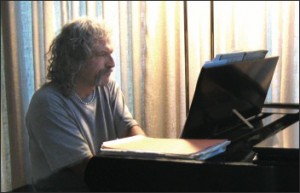
My father was trained as a classical pianist—he had a certificate from Juilliard. He was also a well-known mathematician, and had a brilliant mind. By the time he died, a few years ago, with Alzheimer’s, little remained of the person he had been.
I started writing these poems in the last year of my father’s life. I wrote them, not as a tribute to him, but to help me make the most of our relationship in the little time we had left. I also wrote them to try to make sense of his experience with Alzheimer’s and dementia, and, as language failed him more and more, to find other ways to communicate with him. Touch was one. Music was another. And when he hummed along with me as I played his piano, it was clear—even though so much of who he had been was gone—that he could still “make music”, and, for the first time, make it with me.
So many of us are dealing with this same kind of decline in those we care about. It is hard for us to accept that this is happening to them—to accept that there is nothing we, or they, can do about it—and to accept them—who they are and who they are becoming—and still love them. What’s even harder is to accept that that might be me one day—it might be any of us. And to hope that, if so, those who care about us will accept us, and still love us.
In the end, My Father, Humming is a tribute—it’s a tribute to what it means to be a child; what it means to be a parent; what it means to be a human being.
Others have said it is also a useful book—useful because, when dealing with significant life changes, we often feel alone; we need to know others share the same feelings—grief, joy, anger—all the emotions that come with losing a loved one. My hope is that My Father, Humming does that.
